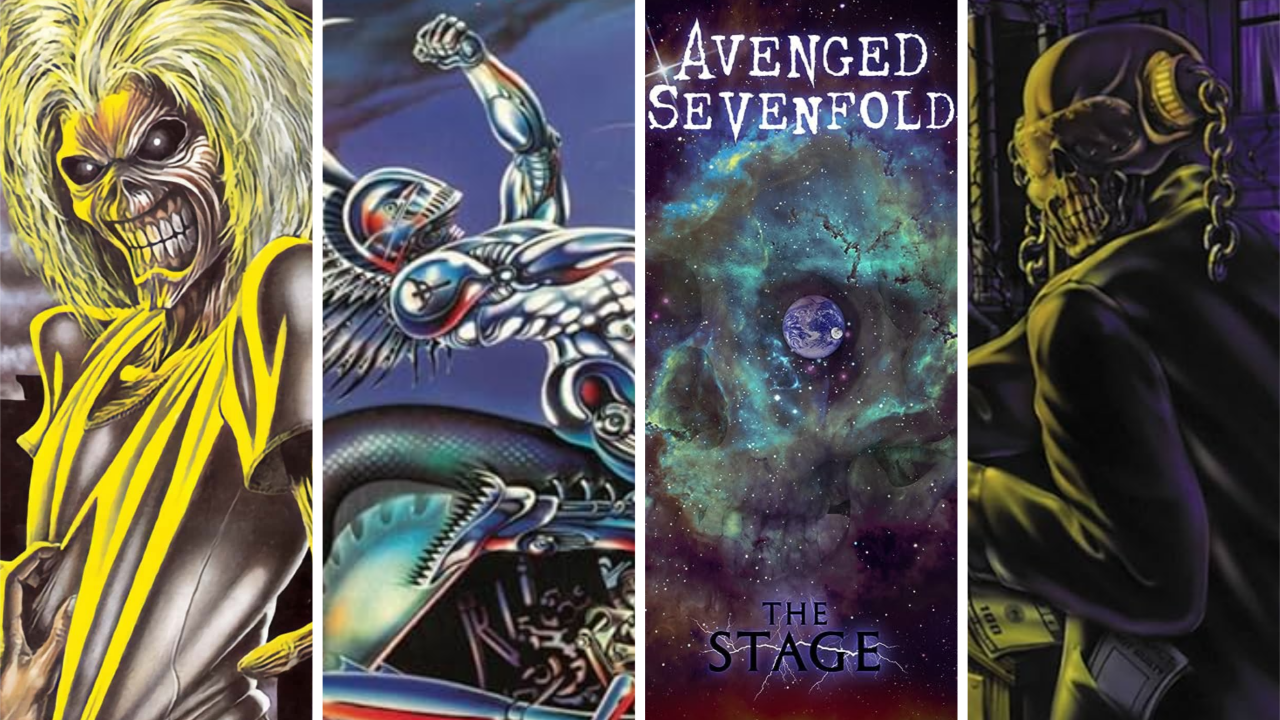10 classic heavy metal albums that didn't sell nearly as well as they should have
These masterpieces by Avenged Sevenfold, Iron Maiden and Judas Priest deserved to rocket up the charts, but fell insultingly short

Select the newsletters you’d like to receive. Then, add your email to sign up.
You are now subscribed
Your newsletter sign-up was successful
Want to add more newsletters?

Every Friday
Louder
Louder’s weekly newsletter is jam-packed with the team’s personal highlights from the last seven days, including features, breaking news, reviews and tons of juicy exclusives from the world of alternative music.

Every Friday
Classic Rock
The Classic Rock newsletter is an essential read for the discerning rock fan. Every week we bring you the news, reviews and the very best features and interviews from our extensive archive. Written by rock fans for rock fans.

Every Friday
Metal Hammer
For the last four decades Metal Hammer has been the world’s greatest metal magazine. Created by metalheads for metalheads, ‘Hammer takes you behind the scenes, closer to the action, and nearer to the bands that you love the most.

Every Friday
Prog
The Prog newsletter brings you the very best of Prog Magazine and our website, every Friday. We'll deliver you the very latest news from the Prog universe, informative features and archive material from Prog’s impressive vault.
While the charts can often be a useful way of measuring an album’s worth, commercial success isn’t always a fair reflection of musical strength. From unconventional marketing tactics to alienating experimentation, there’s plenty of reasons an album might not sell well – and sometimes the very best records can fly under the radar. So, here are some brilliant albums that didn’t get their just desserts from the charts companies of the world.

Avenged Sevenfold – The Stage (2016)
The sudden drop of The Stage came as a total shock – that is, if you heard about it. While the idea of a surprise release may seem exciting in theory, The Stage ended up being Avenged Sevenfold’s worst-charting album in nine years. And that’s a shame. The sci-fi-inspired odyssey saw Avenged try prog out for size, and the result is an intricately layered triumph. The Stage is rich and gorgeously theatrical, with the opening title track eventually getting nominated for a Grammy. Quality stuff.
Iron Maiden – Killers (1981)
Despite charting eight spots lower than their 1980 debut, Killers refined the Iron Maiden formula and proved that the New Wave Of British Heavy Metal leaders weren’t just a flash in the pan. With now-classic songs like Murders In The Rue Morgue and Wrathchild on offer, this album cemented Steve Harris and the boys’ place as heavy metal’s doe-eyed sweethearts forevermore (even with it being swiftly followed by singer Paul Di’Anno’s farewell). Plus, band mascot Eddie got a major make-over, with a far smoother ’do than his god-awful trim on Iron Maiden. Thank God.
Megadeth – The System Has Failed (2004)
The system truly did fail Megadeth when this was released. The System Has Failed wasn’t just a blistering burst of brilliance after a pair of pretty shoddy albums – it also marked Dave Mustaine and co.’s comeback after their future was threatened by a nerve injury. The record is fabulous, with original guitarist Chris Poland wrecking total fretboard carnage, as well as revelling in the thrashiest sound Megadeth had explored in years. Shout-out to The Scorpion in particular for being stellar. However, this grand return was MegaDave’s lowest-charting album in 14 years.
Lamb Of God – Lamb Of God (2020)
If you’ve been sleeping on Lamb Of God’s self-titled album, now’s the time to wake up. Lamb Of God only managed to hit number 15 in the US charts, a criminally sharp drop from the number three spot predecessor VII: Sturm Und Drang climbed to in 2015, despite being equally as magnificent. It’s a return to some of their earlier 2000s sound, and it also serves up some absolutely gold-standard groove riffs. From Memento Mori’s chilling intro to the spine-tinglingly chuggy massacre that is Reality Bath, this shit goes hard.
Judas Priest – Painkiller (1990)
1990’s Painkiller is one of the finest albums that Judas Priest have to offer. Its menacing blaze of speed metal essentially re-wrote the genre’s handbook, giving it one last gasp before grunge and groove metal took over. The album also marked a musical redemption after the disappointingly hit-and-miss Ram It Down – the title track is dedicated to a jacked up Hell’s Angels cyborg cruising in to save humanity from Armageddon, for fuck’s sake! However, despite earning Rob Halford and his fellow Metal Gods a Grammy nomination, Painkiller actually charted lower than Ram….
Motörhead – Another Perfect Day (1983)
Another Perfect Day saw Thin Lizzy’s Brian Robertson filling in on guitar, and it’s a decision Motörhead seemed to regret: Lemmy even went as far as to describe recording with Robertson as “fucking torture”. However, the pain was worth it. From Back At The Funny Farm’s delightfully reverbed riffs to the sturdy whirl of rock ’n’ roll captured on Rock It, Another… came as an electrifying palette cleanser. Despite the album dropping from number six down to 20 in the charts after 1982’s Iron Fist, Robertson totally refreshed Motörhead’s sound.
Sign up below to get the latest from Metal Hammer, plus exclusive special offers, direct to your inbox!
Anthrax – We’ve Come For You All (2003)
Commercially, 2003’s We’ve Come For You All is a far cry from Anthrax’s heyday 10 years prior. Sound Of White Noise charted at number seven, while this barely limped its way to 122. However, the album serves as a mighty return to form after a decade-long creative drought for the band (let’s forget Stomp 442 and Volume 8 ever happened, shall we?). It’s the strongest record of John Bush’s stint as vocalist by far, and Cadillac Rock Box even has a guitar solo by Dimebag Darrell thrown in for the hell of it.
Deftones – Koi No Yokan (2012)
Despite charting far lower than predecessor Diamond Eyes, dropping from number six to 11 on the Billboard rankings, 2012’s Koi No Yokan is a liminal masterpiece. The album is one of Deftones’ softer ventures, yet it offers up some of the Californians’ most mesmerising moments: Koi No Yokan’s multi-textural patchwork of groove, doom and glittering dreamscapes serve as exemplary proof of their hypnotic wiles. From Rosemary’s ethereal metalgaze to the gorgeously emotive Entombed, this stuff stuns, and its charm only ripens more and more with each listen.
Carcass – Surgical Steel (2013)
After 17 long years, Surgical Steel truly knocked out the defibrillator and brought a Carcass back to life. While the album did serve as one of Carcass’ more successful releases, we can’t help but empathise with vocalist Jeff Walker jokingly (we think) calling the album a “failure” for not breaching the top 40. It served as a remarkable snarl of new music from the death metal pioneers, and it’s a damn shame this brutal barrage of carnage didn’t scale higher in the charts.
Testament – The Gathering (1999)
In 2021, Hammer named The Gathering as one of the 20 best metal albums of 1999 – and we stand by it. It is a savage experience, serving up some of the deadliest death/thrash tunes Testament have ever had to offer. Opening on a track as hard-hitting as D.N.R. just says it all, really – not to mention the fact the album featured Death bassist Steve DiGiorgio and Slayer drummer Dave Lombardo. How could it not go hard? And it only charted in Germany?! Not good enough!
Full-time freelancer, part-time music festival gremlin, Emily first cut her journalistic teeth when she co-founded Bittersweet Press in 2019. After asserting herself as a home-grown, emo-loving, nu-metal apologist, Clash Magazine would eventually invite Emily to join their Editorial team in 2022. In the following year, she would pen her first piece for Metal Hammer - unfortunately for the team, Emily has since become a regular fixture. When she’s not blasting metal for Hammer, she also scribbles for Rock Sound, Why Now and Guitar and more.









